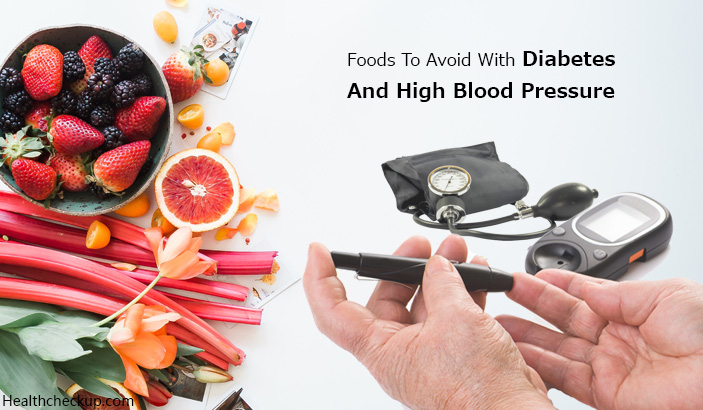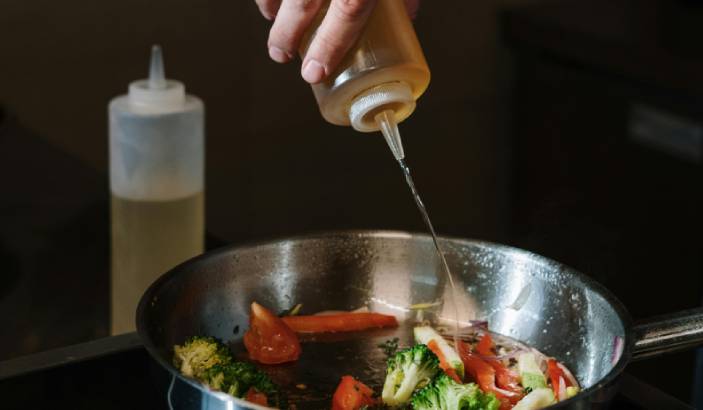Sugar levels in diabetes and blood pressure values in hypertension are influenced, to a great extent by the diet which these patients follow. A common question faced by patients is regarding diet to be followed and foods to avoid with diabetes and high blood pressure.
Patients may have either diabetes or hypertension. Frequently though, diabetes and hypertension co-exist in these patients which increases the risk for complications like stroke, coronary heart disease, atherosclerosis, retinopathy and loss of vision, neuropathy and nephropathy.
If you have diabetes or hypertension, this article will give you a brief idea about how you can control these illnesses through medications and simple dietary changes.
Foods to Avoid with Diabetes and High Blood Pressure
What is Hypertension?
Hypertension is a condition of having abnormally high blood pressure. It is a major contributor towards coronary artery diseases and stroke.
For the purpose of differentiation and understanding, hypertension can be classified into 4 categories
| Category | Systolic (mm of Hg) | Diastolic (mm of Hg) |
| Normal | Less than 120 | Less than 80 |
| Pre-hypertension | 120 – 139 | 80 – 89 |
| Stage I Hypertension | 140 – 159 | 90 – 99 |
| Stage II Hypertension | More than 160 | More than 100 |
| Hypertensive Crisis | More than 180 | More than 120 |
Risk Factors For Having Hypertension
- Age – Blood pressure rises with age. Thi, however,r is not true for all cases.
- String family history of hypertension
- Obesity
- Excessive salt intake
- Consumption of high quantities of saturated fat
- Lack of dietary fiber
- Cigarette smoking and alcohol
- Physical inactivity
- Constant or occupational exposure to noise, vibration, high temperatures and humidity
- Psychological factors like stress
A dietary program was promoted by the National Heart, Lung and Blood Institute, USA to control and prevent high blood pressure and its complications. It is called the DASH diet (Dietary Approach to Stop Hypertension).
There have been researches conducted which prove the efficacy of this diet in not just reducing the blood pressure, but also in reducing weight and preventing osteoporosis, cancer, heart diseases, diabetes, stroke and kidney stones.
The DASH diet emphasizes on maintaining a dietary intake of 2000 calories per day with less than1500mg of salt. It focuses on a diet rich in fruits vegetables, low fat dairy products and consumption of moderate amounts of meat, nuts, legumes and whole grains.
Foods To Avoid with High Blood Pressure
- Avoid excess use of salt in the diet.
- Avoid using cream, cheese and butter
- Avoid canned juices as they contain excess sugar. You can go for freshly made juices at home
- Avoid fat-free cheese as they contain high sodium content
- Avoid frying of vegetables or meat. Opt for boiling or roasting the food.
- Avoid fried and baked foods as they contain trans fats
- Avoid eating foods which contain added sugars as these are of low nutritive value
- Avoid drinking cola, soft drinks and alcoholic drinks
- Caffeine can increase blood pressure. So either avoid or limit intake of caffeine.
What is Diabetes?
Diabetes is a chronic state of high blood sugar levels which occur as a result of impaired secretion or action of insulin.
Similar to hypertension, diabetes is also associated with serious complications like retinopathy, diabetic neuropathy, and diabetic nephropathy and impaired wound healing.
Diabetes Can Be Classified Into The Following Types
- Diabetes Mellitus (DM)
i. Type I – Insulin-dependent diabetes mellitus
ii. Type II – Non-insulin dependent diabetes mellitus
iii. Malnutrition related diabetes mellitus
iv. Secondary Types – Pancreatic, hormonal, drug-related or genetic - Impaired Glucose Tolerance (IGT)
- Gestational Diabetes Mellitus (GDM)
Risk Factors Which Play an Important Role in the Development of Diabetes Mellitus
- Strong family history of diabetes
- Obesity
- Lack of physical activity
- Dietary containing high saturated and unsaturated fats
- Low intake dietary fiber
- Excess intake of alcohol
- Viral infections which cause the destruction of beta-cells like rubella, mumps and human coxsackie virus B4.
For diabetics, the key to keeping blood sugar levels at a desirable range is to divide our three meals of the day into smaller portions and at shorter time intervals.
Foods to Avoid with Diabetes
- Avoid white bread. Choose brown bread or whole grain breads instead.
- Avoid fried foods like potato chips and fries.
- Avoid or limit the intake of bakery products like cakes, muffins and pastries.
- Avoid using mayonnaise. You can opt for mustard instead.
- Avoid full fat milk. Choose fat-free or low fat milk.
- If you are eating salads, avoid the use of salad dressings. Opt for slight seasoning.
- Avoid fruit juices, especially canned one. Eat a fresh, whole fruit instead.
- If you eat meat, opt for skinless chicken.
- Avoid fish oils as they have found to impair glucose control in diabetics.
- Avoid frying the food. You can roast, boil, grill or stir-fry the food instead.
- Avoid nuts and peanut butter as they have high fat content.
- Limit the intake of alcohol. You can ask your doctor how much alcohol can be permitted.
- Avoid sweetened drinks like cola. Diabetics can choose buttermilk as a healthier option.
Management of patients with diabetes and hypertension becomes a major challenge. Diet plays an important role both in controlling the disease and preventing complications.
The motive of avoiding food with diabetes and high blood pressure is not to completely stop having food. You can discuss with your doctor about how much of these foods can be permitted. Guidelines for dietary changes will be slightly different in pregnant women having Gestational Diabetes Mellitus (GDM).
Instead of simply following the foods to avoid with diabetes and high blood pressure, it is important to discuss with your doctor and a dietician and receive a tailor-made diet and guidelines about meal planning which suits your preferences and likings.
Developing new food habits and exercise pattern may seem difficult but in the long-run, this works beneficially to not only prevent complications but also to maintain the overall health of a person. These diet habits can also be followed by people not affected with diabetes and hypertension to reduce weight and avoid the risk of having one of these illnesses in the future.
Dr. Himanshi is a Homoeopathic consultant and currently working as a lecturer in Post-graduate faculty of Homeopathy, Parul University, Vadodara. Completed BHMS and MD in Homeopathy in January 2018 and also has a clinical experience of about 6 years. Personal interests include reading, spending time with family and traveling.









